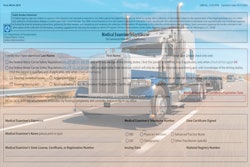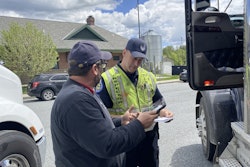Trucking news and briefs for Tuesday, June 24, 2025:
California’s emissions deal with OEMs: WSTA files petition to challenge
The Western States Trucking Association has filed a petition with California’s Office of Administrative Law (OAL) challenging the Clean Truck Partnership (CTP) between the California Air Resources Board (CARB) and truck manufacturers.
Cummins, Daimler Trucks North America, Hino, Isuzu, then-Navistar, Paccar, the Truck and Engine Manufacturers Association, and Volvo Group North America in July 2023 were among 11 signers of the CTP, an agreement with CARB that pledged truck and engine manufacturers would meet California’s vehicle standards and required the sale and adoption of zero-emission vehicle (ZEV) technology, "regardless of whether any other entity challenges California’s authority to set more stringent emissions standards under the federal Clean Air Act."
In the wake of Congress disapproving of the Environmental Protection Agency’s waivers for CARB’s Omnibus Low-NOx and Advanced Clean Trucks (ACT) regulations, WSTA believes CARB cannot require manufacturers to comply with the CTP, as CARB no longer has authorization from the EPA to enforce the Omnibus and ACT regs.
[Related: Trump signs resolutions to ‘kill’ California’s emissions waivers]

WSTA’s petition claims that the CTP “is an improperly adopted ‘regulation’ under California's Administrative Procedure Act (APA)” that “applies generally to all manufacturers of internal-combustion powered on-road heavy-duty trucks and engines and requires those companies to follow CARB regulations even when those regulations have no federal authorization.”
The organization says that an OAL determination on the legality of the CTP “is of vital public interest and importance to all Californians, and it is necessary to ensure that stakeholders can publicly participate in the development of rulemaking that impacts heavy-duty truck and engine availability and prices in California.”
Since the passage of the Congressional Review Act disapprovals, CARB has indicated that it will still hold manufacturers to the CTP. Because of this, WSTA says CARB is treating the CTP as a regulation that is subject to the Administrative Procedure Act.
“Framing the CTP as a contract with private parties does not exempt the CTP from being a regulation of general applicability subject to the APA,” WSTA said. “Both California law and general principles of administrative law dictate that a government agency may not use an agreement with a regulated party to avoid the APA requirements associated with rulemaking.”
In contending that the CTP is a regulation rather than just an agreement, WSTA said CARB didn’t follow APA procedures in promulgating the CTP, including filing a copy with the Secretary of State of California and providing notice and the opportunity for public comment.
[Related: Will CARB's emissions deal with truck makers survive Congress' waiver revocation?]
Senate version of bill to increase dry bulk weight variance introduced
A piece of companion legislation to go along with a trucking-related bill introduced in the U.S. House in April has now been introduced in the Senate. That bill, the VARIANCE Act (or Vehicle Axle Redistribution Increases Allow New Capacities for Efficiency Act), would allow a 10% axle weight variance for commercial motor vehicles transporting dry bulk goods.
The House version was introduced earlier this year by Reps. Rick Crawford (R-Arkansas) and Salud Carbajal (D-California). Now in the Senate, Sens. Pete Ricketts (R-Nebraska) and Adam Schiff (D-California) have introduced the bill.
“This is common-sense policymaking,” said Ricketts. “Allowing flexibility for truckers with naturally shifting goods will help improve efficiency and safety in Nebraska’s agriculture industry. American truckers want to carry the same sized load in loose dry bulk that they can for any other freight. This bill is a win for every step along the supply chain.”
Ultimately, the bill would grant a 10% axle variance for trucks transporting dry bulk goods and increase the maximum weight on any tandem-axle trailer to 37,400 pounds. The maximum laden weight for the entire tractor-trailer unit would remain untouched at 80,000 pounds.
As of June 24, the House version of the bill is awaiting action in the Subcommittee on Highways and Transit, and the Senate version has been referred to the Committee on Environment and Public Works.
[Related: One owner-op's long road to steady dry bulk freight, for the whole family]
New electric truck charging depot in development at Port of Oakland
Heavy-duty electrification services provider WattEV has broken ground on its sixth heavy-duty electric truck charging depot in California, located at the Port of Oakland.
This new charging depot will establish a zero-emission freight corridor from the Bay Area to Sacramento, Nevada and beyond, the company said.
“We’ve been working towards opening a Northern California charging depot for several years,” said Salim Youssefzadeh, CEO and co-founder of WattEV. “Until now, most truck charging infrastructure has been concentrated in Southern California. This project marks a significant milestone for WattEV, the Bay Area, and California’s zero-emission freight future.”
WattEV’s public charging depot will be capable of charging 25 medium- and heavy-duty electric trucks concurrently at up to 240 KW each or six trucks at 1.2 MW. The depot is designed for megawatt charging, reducing charging “dwell times” to 30 minutes or less, comparable to diesel refueling times, the company added.
The Port of Oakland depot will add to WattEV’s existing network of five charging depots located at the Port of Long Beach, Bakersfield, San Bernardino, Gardena and Vernon.
[Related: Electric trucks for Cali port drayage: CARB mandate will be repealed once and for all]








